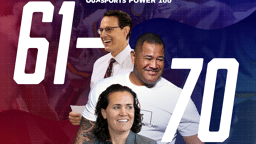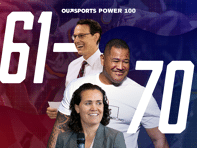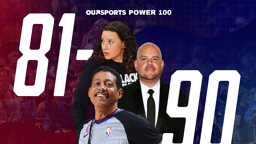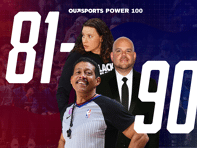Last Friday, Minnesota United player Collin Martin came out publicly hours before the club hosted its Pride Night to celebrate the LGBTQ community. Anticipation was that Martin would play in the match, but then … nothing. He stayed on the sideline, prompting public disappointment from some.
Why did he not play? He is the only publicly out LGBTQ athlete playing in major men’s pro sports in North America, it was the team’s Pride Night, and he had been playing regularly for the last couple of months.
It’s an important question to ask, and Martin’s own post-match comments have given rise to both speculation and a possible answer.
Before we dig too deep into this, we want to be perfectly clear about one thing: We do not believe there was any outward homophobia from anyone with the club against Martin because he’s gay.
Martin has been out to the team for a year, he has expressed complete support from everyone around him, the team has expressed support, the league has expressed support both publicly and privately, and various teammates and coaches have very organically and naturally made it clear they love Martin and entirely support him.
Any insinuation that Martin has been rejected by the team, or that he is being punished for being gay, is completely false and based on no facts. Zero.
Martin was not discriminated against because he’s gay.
There are reasons we recommend that LGBTQ professional athletes come out publicly during the offseason.
With that being said, Martin himself raised an interesting question in his post-match interviews that raised our eyebrows here at Outsports. When asked if he had an extra desire to play on Pride Night given his public announcement, he said he did. Then he gave a possible explanation for his lack of playing time.
“I want to play every game, so that is normal,” he said. “Maybe he thought I had a lot going on today.”
The “he” in question is club manager Adrian Heath, who has the final voice on line-ups and substitutions.
Various requests by Outsports to speak with Martin have been ignored by the club.
When asked about Martin’s decision to come out publicly, Heath was pitch-perfect.
“It’s something this club has always talked about, being inclusive to everybody,” Heath said, “so he’ll make no difference to us.”
We believe Heath with no reservation.
Yet Martin’s comment — about the perception he was too distracted on Friday to play effectively — lingers. If an LGBTQ athlete wants to come out, be it privately or publicly, should the timing of their choice have an impact on their playing status?
While we discredit almost every nonsensical “distraction” issue, this one question — coming out literally hours before a match and suddenly juggling lots of interest — as an important one.
Eli Hoff, managing editor of Outsports’ Minnesota United sister site E Pluribus Loonum, reflected the public anticipation of Martin playing in his column recapping his post-match interview and media scrum with Martin.
“Though many fans expected Martin to appear in the match, either as a substitute or a starter, neither came to be,” Hoff wrote.
Minneapolis Star-Tribune sports writer Megan Ryan, who covers the Minnesota United, told Outsports that, prior to his coming out, Martin’s starting and playing status likely “could have gone either way.”
Ryan said that Martin has regularly started in a 4-3-3 formation lineup for the United. Against Dallas the club opted for a 3-5-2 lineup. She said it might have been a surprise that Collen Warner started over Martin, but that it wasn’t an egregious shock.
Until Friday, Warner had played in half as many matches as Martin — three vs. six. He hadn’t started since March, while Martin had started five of the club’s previous eight matches.
While it may not have been a shocker, it raises some eyebrows.
Yet, frankly, it’s also understandable. People talk about the “distraction” of a gay athlete, and it’s something we at Outsports completely dismiss. Gay athletes are not a distraction, as many have come out and been part of teams that went on to do great things. Any extra cameras or media attention is hardly a distraction to a team trying to get to a league championship.
RELATED: Derrick Gordon and Seton Hall destroy the ridiculous ‘gays as distraction’ myth
However.
There are reasons we recommend to LGBTQ professional athletes that they come out publicly during the offseason. An MLS player coming out publicly in January has a couple months to get through the cameras and attention before ever having to step foot on a pitch for a meaningful game.
Martin came out publicly at 10 a.m. last Friday with a match at 7 p.m on the same day.
Brave. Courageous. Trailblazing. Inspiring. Amazing.
Yet it was also risky in a way we have not seen before, not because of the possible long-term reactions from people on his team, but because of the actual, real risk of a pertinent distraction in his life hours before his match.
Even Martin himself said his coming out on game day created complications that may have better served him another time.
“If I was going to do it differently next,” Martin said, “I would not have done it on a game day. It has been crazy in terms of logistics.”
According to Ryan, Martin was so busy giving media interviews on Friday that he was unable to take his usual game-day nap. Breaking from game-day norm for a professional athlete is not a deal-breaker but it is significant.
In addition, at halftime Martin left the team locker room to give the club’s community award to Dot Beltsler, the executive director of Twin Cities Pride. Ryan said it’s out of the ordinary for a player to be involved in the halftime award ceremony.
Again, not a deal-breaker… but significant.
Ryan said that much of Martin’s game-day prep was turned upside down on Friday.
While Hoff believed that Martin should have played Friday, he echoed much of what Ryan said.
“Friday was very abnormal for him,” Hoff told Outsports. “Players are usually not available on game day before the game. He was doing an interview with NBC, and I know he was doing one with the local NBC affiliate too. Plus those were at the stadium, which was also abnormal.”
Hoff said exacerbating that is that Martin wasn’t, until Friday, in high demand from the media. Suddenly seemingly everyone wanted to talk with him. Plus, he’d been setting the stage for his big coming out with his family and club all week.
There were, beyond his coming-out announcement, extenuating circumstances.
Another key issue of note is the nature of substitutions in soccer. MLS clubs, like most professional soccer clubs around the world, are allowed only three subs in a match. This isn’t like basketball where a coach can send a player into the game, see how he’s playing, and get him back on the bench if it isn’t going well. If Martin had gone in, with only three substitutions allowed in MLS, he’d be there for the duration.
Over the weekend, Heath answered a question about his decision to sit Martin. He gave the perfect answer to why he substituted Frantz Pangop instead of Martin in the 77th minute.
“I just wanted a more offensive player on the field,” Heath said, according to Ryan. “I felt that we needed to score a goal, and I think Frantz is more dangerous in the final third than Collin. That’s just the nature of their positions and the way that they play.”
In six seasons with D.C. United and Minnesota United, Martin has zero goals and three assists in MLS matches. MLS’ own Web site describes Pangop: “quick, dynamic and has the skill to create and score goals”
It was very disappointing that MLS’ only publicly out gay athlete did not play on his club’s own Pride Night. No athlete should lose playing time because of the timing of their coming out. That he was not recognized formally in any way during said Pride Night speaks poorly of the club’s execution of the event.
However, Martin’s topsy-turvy Friday, and the nature of soccer, are certainly extenuating circumstances. In this particular case, given all of the circumstances, if the club managers and coaches took all this into consideration, it’s actually — in this individual case — understandable.
For more Minnesota United news and notes, visit E Pluribus Loonum.





































